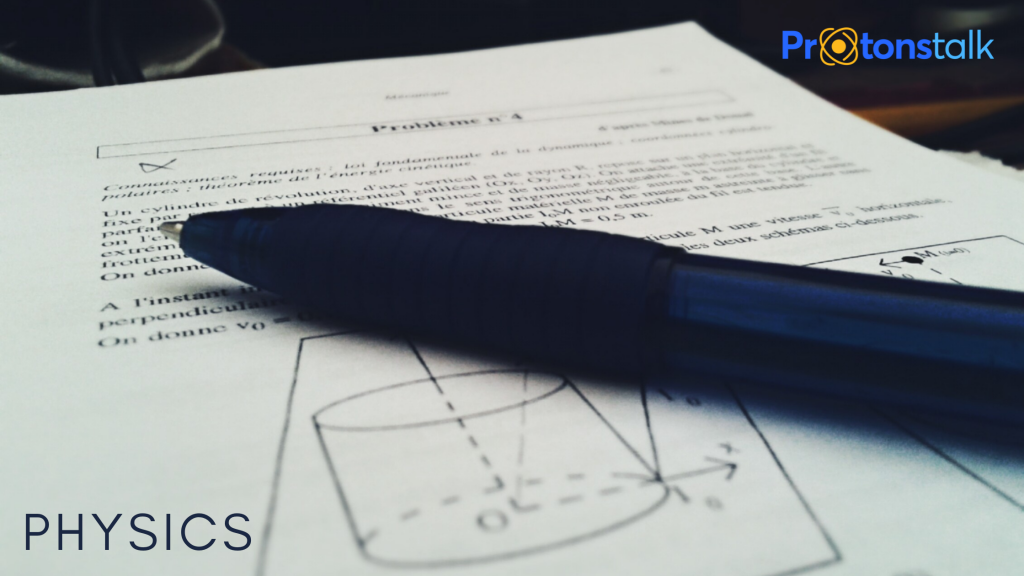
The syllabus for Physics Jee mains 2021 divided into two sections: Section A and Section B.
Section A includes the theory component, which has an 80 percent weightage.
Section B includes the practical component, which has a 20 percent weightage.
The Physics Jee mains syllabus incorporates courses from both the class 11 and 12 physics curriculum in the ratio prescribed by NTA (National Testing Agency).
Physics is all about logic and principles. It can be challenging at times, especially when topics get more conceptual. In physics, complexity rises when concepts from two different chapters combine in a single question. Chapters like electrodynamics frequently combined with gravitation, resulting in questions that are difficult to understand. Many physics JEE Mains applicants find it difficult and a huge proportion of candidates probably ignore physics. It is also critical to understand the difficulty level and weightage of the various topics for the same reason. Here you will learn about the most important JEE Main physics topics and how much effort they take.
High scoring topic in physics paper
There are some topics with a lot of weightage and points, but they’re a little tricky. These topics need you to properly understand concepts, and once you have done so, you will be able to improve your score by using these topics. The following is a list of such topics:
- Magnetism
- Rotation
- Electromagnetism
- Simple Harmonic Motion
The above topics may appear difficult at first, but after you cover them, you will find them quite interesting.
Electromagnetism and rotation are also crucial, and JEE gives them a lot of importance. These chapters are challenging and extensive. Both the JEE Main and JEE Advanced exams depend on them. Here are some suggestions to deal with them:
- Concentrate on concepts rather than formulas. Develop a habit of solving subjective problems based on these topics, as this will greatly assist you in deriving things on your own from the very basics.
- Before you begin solving the problem, make sure to draw diagrams for the questions from these categories and thoroughly study the topics.
- Practice a lot to ensure that you understand all of the topics and practice a variety of question sets to solidify your understanding.
- Last year’s papers must be completed in order to become familiar with the types of questions posed in both JEE Main and Advanced.
However, because these chapters are a little challenging, don’t stick to questions you can’t finish in time. Don’t spend too much time on them and go on with your work. In JEE Advanced, these chapters asked in far greater numbers than in JEE Main.
To figure out the key to a problem in JEE Advanced, look at it from a very fundamental standpoint. Physics may appear difficult in JEE Advanced, but if you understand the concept, you will score well, therefore be sure of your concepts.
Easier JEE Physics topics that are also high-scoring
Several topics on the JEE Physics paper don’t need much work but have a high score. Such topics must be completed without fail to increase one’s score. These are more formula-based issues that don’t require you to put much effort into the concepts. The following is a list of topics that fit under this heading:
- Modern physics
- Current electricity
- Heat and thermodynamics
- Oscillations and sound
- Newton’s laws of motion
The questions in the preceding chapters are more common, and they aren’t particularly difficult. They won’t take up much of your time and won’t be difficult to understand. It would be sufficient to prepare them using any coaching materials or a standard book such as Cengage or DC Pandey.
You should still practice them thoroughly since the more you practice, the easier it will become to answer questions about them.
The major aim of properly preparing these chapters is that the questions from these topics will be answered easily, saving you time and allowing you to focus on other, more difficult issues. Here are some pointers to help you prepare for such chapters:
- Concentrate more on formulas and put in a lot of practice time.
- Make a list of all the formulas from these chapters, as well as any theory topics you need to remember. Questions based on direct theory can also be found in chapters like current physics.
- When it comes to such matters, place a greater emphasis on speed and accuracy.
- Archives are necessary, and you should try to complete them on time.
- Make your preparations a little more consistent. You could refer to the formula list from time to time or complete a 30-minute quiz sheet to refresh your memory on the formulas and concepts of such topics.
- Physics is hard for most students, but once you understand how to approach it, you will be able to get success. Physics is all about studying in a systematic and exam-specific manner. Doing previous year’s papers is also essential for the same reason.
The concepts mentioned above will definitely assist you in mastering these simpler subjects. With the questions from these topics, try to be as precise as possible. These topics are meant to help you improve both your score and your confidence. Make sure you don’t miss any of these sections. Even if you don’t have much time, you should look up a summary and formulas for these topics in any basic book so that you can answer any easy questions that occur.
Doing previous year’s papers is also crucial for the same reason. Simply put, don’t give up on physics, and whenever you’re feeling down about it, solve a lot of elementary problems to improve your confidence. You can then move on to the higher-level problems.
